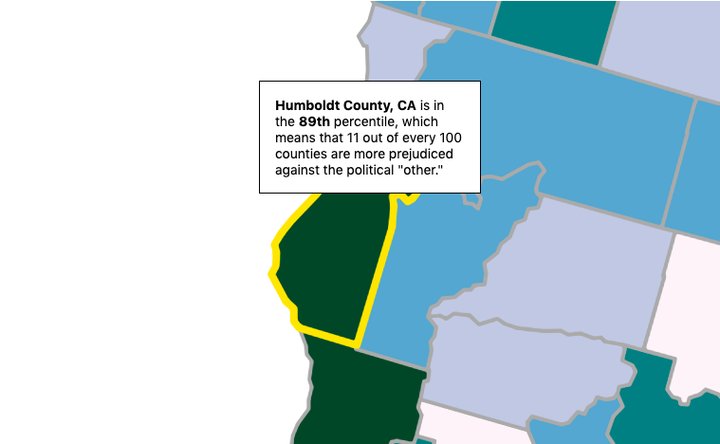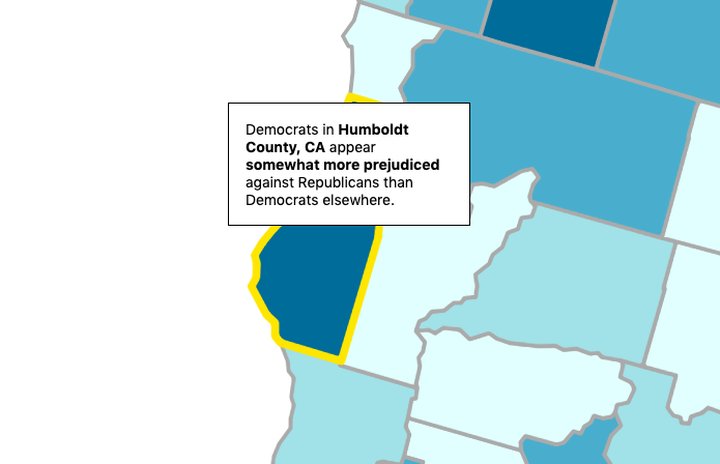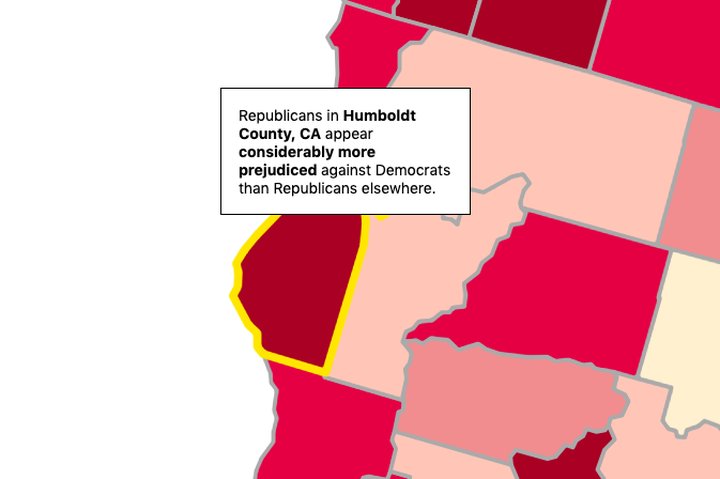
Detail of an interactive map at The Atlantic website.
We may think of ourselves as a pretty open-minded bunch here in Humboldt County, but the data says otherwise — at least the data compiled by The Atlantic magazine in collaboration with the polling and analytics firm PredictWise.
According to the interactive maps published earlier this week, Humboldt County is in the 89th percentile for political prejudice, meaning we’re less tolerant than all but about one in 10 counties nationwide. We tend to assume the worst about our political adversaries, in other words.
Now, there’s reason to be a bit skeptical about the reliability of this data, especially in rural counties such as ours. PredictWise partnered with Pollfish to run a nationwide survey of 2,000 adults, gathering their opinions about the other party.
How would you feel if someone in your immediate family married a Republican versus a Democrat?
How well does the term “Compassionate” describe Democrats?
How well does the term “Patriotic” describe Republicans?
And so on.
PredictWise co-founder Tobias Konitzer then analyzed the demographic characteristics of respondents to see which ones correlate with partisan prejudice. “In general,” the Atlantic reports, “the most politically intolerant Americans, according to the analysis, tend to be whiter, more highly educated, older, more urban, and more partisan themselves.”
Humboldt County is whiter, slightly more educated and just barely younger than the country at large, according to U.S. Census data.
But how can a poll of just 2,000 people be used for a map of the entire country and all 3,000-plus counties within? Well, Konitzer created a profile of “contemporary partisan prejudice” based on the polling results and then extrapolated that onto the rest of the country using voter files.
This method relies on a big assumption, the Atlantic notes — namely, “that people with similar demographics and levels of partisan loyalty, living in neighborhoods with comparable amounts of political diversity, tend to hold similar attitudes about political difference.”
(If you’re a math nerd who really wants to dive deep into the methodology, you can read more about it here.)
As the story’s authors note, the whole country is becoming more politically polaraized as we hunker in our social media echo chambers and craft monstrous caricatures of our political foes. And our political allegiances have come somewhat unmoored from legislative positions.
“As politics have become more about identity than policy, partisan leanings have become more about how we grew up and where we feel like we belong,” the story notes. “Politics are acting more like religion, in other words.”
For what it’s worth, the analysis found that Humboldt County Republicans distrust Democrats more than Humboldt County Democrats distrust Republicans, though neither side is exactly open-hearted, compared to the rest of the country.


Does this ring true to you, LoCO readers? Are we less politically tolerant here than people elsewhere? Or do you think this is bunk — maybe even propaganda funded by [George Soros/The Koch Brothers] in their grand scheme to manifest a [communist/fascist] revolution?
We’ll let you sort it out in the comment section below. But we’ll leave you with this, from the Atlantic:
Conflict and protest are vital to democracy. But whenever people begin to caricature one another, anywhere in the world, predictable tragedies occur. Fixable problems do not get fixed. Neighbors become estranged, embittered, and sometimes violent. Everyone ends up worse off, sooner or later.
Happy Friday, fellow humans.
CLICK TO MANAGE